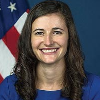The Research and Innovative Technology Administration was created by the Norman Y. Mineta Research and Special Programs Improvement Act, which sought to build “a more focused research organization” for the Department of Transportation, in addition to speeding up the process for delivering new technologies to the public. President George W. Bush signed the act into law on Nov. 30, 2004. It is named after Transportation Secretary Norman Mineta, who served from 2001 to 2006.
Airline On-Time Performance Slips, Cancellations and Mishandled Bags Up in June
(Press Release)
- Table of Contents
- Overview
- History
- What it Does
- Where Does the Money Go
- Controversies
- Suggested Reforms
- Comments
- Leave a comment


Sophie Shulman, who began her career as a presidential management fellow, served as acting director of the Research and Innovative Technology Administration in the Department of Transportation (DOT) from November 2016 to January 2017.
Shulman is from Seattle, where she graduated from the Lakeside School in 2006. She then went east for college, earning a B.A. in international studies in 2010 and an M.A. in American foreign policy, international economics from Johns Hopkins University in 2011.
Shulman’s first federal job was in May 2011 in the Department of Energy in the Presidential Management Fellow Program, serving as a special assistant in the office of the secretary. In September 2012, Shulman moved to the Office of Management and Budget in the Natural Resources, Energy and Science Program.
In April 2013, Shulman took a job in the White House as deputy press secretary and executive secretary for the Domestic Policy Council, moving up to deputy press secretary in November. In July 2014, Shulman was named the council’s deputy chief of staff.
She moved to DOT in June 2015, first as a policy adviser in the office of the secretary, then, in April 2016, as senior policy adviser. While at DOT, Shulman worked on the Smart City Challenge, in which medium-sized cities were given the opportunity to come up with plans for integrated efficient transportation systems optimizing technology and data.
-Steve Straehley
To Learn More:
Laying the Groundwork for Innovation (by Sophie Shulman)

President Obama has nominated Gregory D. Winfree, who is deputy administrator of the Research and Innovative Technology Administration (RITA) in the Department of Transportation, to take the agency’s top job. He has served at RITA, which manages the department’s research and development programs with the goal of creating technologies to improve transportation, since March 2010.
Born in New York circa 1964, Winfree earned a B.S. in Communications and Public Relations at St. John’s University in 1986 and a J.D. from Georgetown University in 1989, where he served as a lead articles editor for The Tax Lawyer, the A.B.A. journal of taxation.
After a stint as a litigation associate at Venable, Baetjer, Howard & Civiletti in Washington, D.C., from 1989 to 1991, about which he later wrote a chapter in the book My First Year as a Lawyer: Real-World Stories from America’s Lawyers, Winfree served as a trial attorney in the Housing and Civil Enforcement Section of the United States Department of Justice Civil Rights Division from 1991 to 1993.
Embarking on an in-house career, Winfree was senior litigation counsel at Union Carbide from 1993 to 2000, and director of litigation at Wyeth Pharmaceuticals, which is now part of Pfizer, from 2000 to 2004.
From 2004 to 2010, Winfree was chief litigation counsel for Freeport-McMoRan Corporation, which through its subsidiary, Phelps Dodge, is one of the world’s largest producers of copper, gold and other industrial and precious metals. During these years, Winfree resided in Phoenix, Arizona, where he also founded the Eight Iron Golf Apparel Company to market his two patents, registered in 1995, for a “sport shirt or other garment provided with a load-distributing shoulder yoke for relieving the strain resulting from carrying a golf bag.”
Winfree was also the co-founder of Charting Your Own Course (CYOC), a professional networking organization for minority in-house attorneys.
Winfree left the private sector for public service again in 2010, serving as chief counsel at RITA from March 2010 to August 2011, as deputy administrator since June 2011, and as acting administrator from September 2011 to January 2012.
-Matt Bewig
- Latest News
- D.C. Public Schools will Teach all Second-Graders to Ride a Bike
- New Rule in Germany Limits Sales of Sex-Themed E-Books to 10pm to 6am
- What Happened to the 6-Year-Old Tibetan Boy the Chinese Government Kidnapped 20 Years Ago?
- U.S. Ambassador to Turkey Photoshops his Hair Color to Mock Turkish Mayor
- Mystery Artist Calls Attention to Unfixed Potholes by Drawing Penises around Them
The Research and Innovative Technology Administration was created by the Norman Y. Mineta Research and Special Programs Improvement Act, which sought to build “a more focused research organization” for the Department of Transportation, in addition to speeding up the process for delivering new technologies to the public. President George W. Bush signed the act into law on Nov. 30, 2004. It is named after Transportation Secretary Norman Mineta, who served from 2001 to 2006.
Airline On-Time Performance Slips, Cancellations and Mishandled Bags Up in June
(Press Release)
Comments


Sophie Shulman, who began her career as a presidential management fellow, served as acting director of the Research and Innovative Technology Administration in the Department of Transportation (DOT) from November 2016 to January 2017.
Shulman is from Seattle, where she graduated from the Lakeside School in 2006. She then went east for college, earning a B.A. in international studies in 2010 and an M.A. in American foreign policy, international economics from Johns Hopkins University in 2011.
Shulman’s first federal job was in May 2011 in the Department of Energy in the Presidential Management Fellow Program, serving as a special assistant in the office of the secretary. In September 2012, Shulman moved to the Office of Management and Budget in the Natural Resources, Energy and Science Program.
In April 2013, Shulman took a job in the White House as deputy press secretary and executive secretary for the Domestic Policy Council, moving up to deputy press secretary in November. In July 2014, Shulman was named the council’s deputy chief of staff.
She moved to DOT in June 2015, first as a policy adviser in the office of the secretary, then, in April 2016, as senior policy adviser. While at DOT, Shulman worked on the Smart City Challenge, in which medium-sized cities were given the opportunity to come up with plans for integrated efficient transportation systems optimizing technology and data.
-Steve Straehley
To Learn More:
Laying the Groundwork for Innovation (by Sophie Shulman)

President Obama has nominated Gregory D. Winfree, who is deputy administrator of the Research and Innovative Technology Administration (RITA) in the Department of Transportation, to take the agency’s top job. He has served at RITA, which manages the department’s research and development programs with the goal of creating technologies to improve transportation, since March 2010.
Born in New York circa 1964, Winfree earned a B.S. in Communications and Public Relations at St. John’s University in 1986 and a J.D. from Georgetown University in 1989, where he served as a lead articles editor for The Tax Lawyer, the A.B.A. journal of taxation.
After a stint as a litigation associate at Venable, Baetjer, Howard & Civiletti in Washington, D.C., from 1989 to 1991, about which he later wrote a chapter in the book My First Year as a Lawyer: Real-World Stories from America’s Lawyers, Winfree served as a trial attorney in the Housing and Civil Enforcement Section of the United States Department of Justice Civil Rights Division from 1991 to 1993.
Embarking on an in-house career, Winfree was senior litigation counsel at Union Carbide from 1993 to 2000, and director of litigation at Wyeth Pharmaceuticals, which is now part of Pfizer, from 2000 to 2004.
From 2004 to 2010, Winfree was chief litigation counsel for Freeport-McMoRan Corporation, which through its subsidiary, Phelps Dodge, is one of the world’s largest producers of copper, gold and other industrial and precious metals. During these years, Winfree resided in Phoenix, Arizona, where he also founded the Eight Iron Golf Apparel Company to market his two patents, registered in 1995, for a “sport shirt or other garment provided with a load-distributing shoulder yoke for relieving the strain resulting from carrying a golf bag.”
Winfree was also the co-founder of Charting Your Own Course (CYOC), a professional networking organization for minority in-house attorneys.
Winfree left the private sector for public service again in 2010, serving as chief counsel at RITA from March 2010 to August 2011, as deputy administrator since June 2011, and as acting administrator from September 2011 to January 2012.
-Matt Bewig
- Latest News
- D.C. Public Schools will Teach all Second-Graders to Ride a Bike
- New Rule in Germany Limits Sales of Sex-Themed E-Books to 10pm to 6am
- What Happened to the 6-Year-Old Tibetan Boy the Chinese Government Kidnapped 20 Years Ago?
- U.S. Ambassador to Turkey Photoshops his Hair Color to Mock Turkish Mayor
- Mystery Artist Calls Attention to Unfixed Potholes by Drawing Penises around Them





Comments